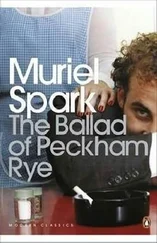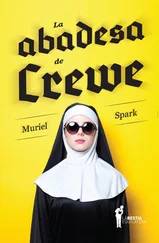"Is that the May of Teck Club?"
"Yes."
"May I speak to Miss Wright privately, please?"
At one of these moments the secretary on duty said to him, "All the members' calls are private. We don't listen in."
"Good. I would know if you did, I wait for the click before I speak. Kindly remember."
Jane had to apologise to the office for him. "He's a foreigner. It's in connection with the world of books. It isn't my fault."
But another and more presentable man from the world of books had lately put in an appearance for Jane. She had brought him into the drawing room and introduced him to Selina, Anne and the mad girl Pauline Fox who dressed up for Jack Buchanan on her lunatic evenings.
This man, Nicholas Farringdon, had been rather charming, though shy. "He's thoughtful," Jane said. "We think him brilliant but he's still feeling his way in the world of books."
"Is he something in publishing?"
"Not at the moment. He's still feeling his way. He's writing something."
Jane's brain-work was of three kinds. First and secretly, she wrote poetry of a strictly non-rational order, in which occurred, in about the proportion of cherries in a cherry-cake, certain words that she described as "of a smouldering nature," such as loins and lovers, the root, the rose, the seawrack and the shroud. Secondly and secretly, she wrote letters of a friendly tone but with a business intention, under the auspices of the pale foreigner. Thirdly and more openly, she sometimes did a little work in her room which overlapped from her day's duties at the small publisher's office.
She was the only assistant at Huy Throvis-Mew Ltd. Huy Throvis-Mew was the owner of the firm, and Mrs. Huy Throvis-Mew was down as a director on the letter heading. Huy Throvis-Mew's private name was George Johnson, or at least it had been so for some years, although a few very old friends called him Con and older friends called him Arthur or Jimmie. However, he was George in Jane's time, and she would do anything for George, her white-bearded employer. She parcelled up the books, took them to the post or delivered them, answered the telephone, made tea, minded the baby when George's wife, Tilly, wanted to go and queue for fish, entered the takings into ledgers, entered two different versions of the petty cash and office expenses into two sets of books, and generally did a small publisher's business. After a year George allowed her to do some of the detective work on new authors, which he was convinced was essential to the publishing trade, and to find out their financial circumstances and psychological weak points so that he could deal with them to a publisher's best advantage.
Like the habit of changing his name after a number of years, which he had done only in the hope that his luck would turn with it, this practice of George's was fairly innocent, in that he never really succeeded in discovering the whole truth about an author, or in profiting by his investigations at all. Still, it was his system, and its plot-formation gave him a zest for each day's work. Formerly George had done these basic investigations himself, but lately he had begun to think he might have more luck by leaving new authors to Jane. A consignment of books, on their way to George, had recently been seized at the port of Harwich and ordered to be burnt by the local magistrates on the grounds of obscenity, and George was feeling unlucky at this particular time.
Besides, it saved him all the expense and nervous exhaustion involved in the vigilant lunching with unpredictable writers, and feeling his way with them as to whether their paranoia exceeded his. It was better altogether to let them talk to Jane in a cafй, or bed, or wherever she went with them. It was nerve-racking enough to George to wait for her report. He fancied that many times in the past year she had saved him from paying out more ready money for a book than necessary-as when she had reported a dire need for ready cash, or when she had told George exactly what part of the manuscript he should find fault with-it was usually the part in which the author took a special pride-in order to achieve the minimum resistance, if not the total collapse, of the author.
George had obtained a succession of three young wives on account of his continuous eloquence to them on the subject of the world of books, which they felt was an elevating one-he had deserted the other two, not they him-and he had not yet been declared bankrupt although he had undergone in the course of the years various tangled forms of business reconstruction which were probably too much for the nerves of his creditors to face legally, since none ever did.
George took a keen interest in Jane's training in the handling of a writer of books. Unlike his fireside eloquence to his wife, Tilly, his advice to Jane in the office was furtive, for he half believed, in the twilight portion of his mind, that authors were sly enough to make themselves invisible and be always floating under the chairs of publishers' offices.
"You see, Jane," said George, "these tactics of mine are an essential part of the profession. All the publishers do it. The big firms do it too, they do it automatically. The big fellows can afford to do it automatically, they can't afford to acknowledge all the facts like me, too much face to lose. I've had to work out every move for myself and get everything clear in my mind where authors are concerned. In publishing, one is dealing with a temperamental raw material."
He went over to the corner curtain which concealed a coat-rail, and pulled aside the curtain. He peered within, then closed the curtain again and continued, "Always think of authors as your raw material, Jane, if you're going to stay in the world of books." Jane took this for fact. She had now been given Nicholas Farringdon to work on. George had said he was a terrible risk. Jane judged his age to be just over thirty. He was known only as a poet of small talent and an anarchist of dubious loyalty to that cause; but even these details were not at first known to Jane. He had brought to George a worn-out-looking sheaf of typewritten pages, untidily stacked in a brown folder. The whole was entitled _The Sabbath Notebooks__.
Nicholas Farringdon differed in some noticeable respects from the other writers she had come across. He differed, unnoticeably so far, in that he knew he was being worked on. But meantime she observed he was more arrogant and more impatient than other authors of the intellectual class. She noticed he was more attractive.
She had achieved some success with the very intellectual author of _The Symbolism of Louisa May Alcott__, which George was now selling very well and fast in certain quarters, since it had a big lesbian theme. She had achieved some success with Rudi Bittesch, the Rumanian who called on her frequently at the club.
But Nicholas had produced a more upsetting effect than usual on George, who was moreover torn between his attraction to a book he could not understand and his fear of its failure. George handed him over to Jane for treatment and meanwhile complained nightly to Tilly that he was in the hands of a writer, lazy, irresponsible, insufferable and cunning.
Inspired by a brain-wave, Jane's first approach to a writer had been, "What is your raison d'кtre?" It had worked marvellously. She tried it on Nicholas Farringdon when he called to the office about his manuscript one day when George was "at a meeting," which was to say, hiding in the back office. "What is your raison d'кtre, Mr. Farringdon?"
He frowned at her in an abstract sort of way, as if she were a speaking machine that had gone wrong.
Inspired by another brain-wave, Jane invited him to dine at the May of Teck Club. He accepted with a special modesty, plainly from concern for this book. It had been rejected by ten publishers already, as had most of the books that came to George.
Читать дальше












